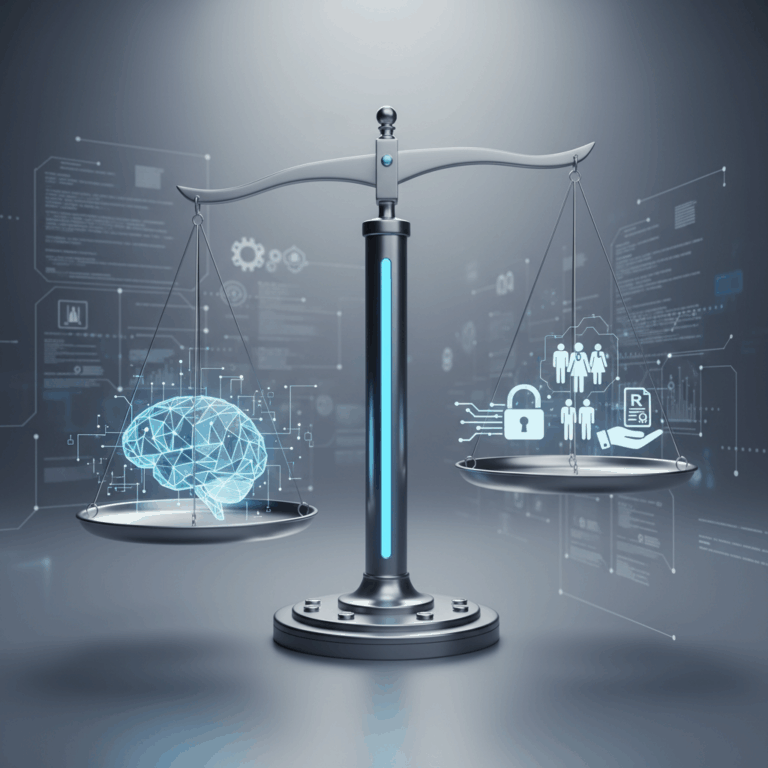Key Issues in AI Ethics
The rapid integration of artificial intelligence into daily life has raised urgent concerns about its ethical impact. Among the most critical issues are privacy, fairness, and accountability. These form the foundation of the ongoing debate on AI ethics.
Privacy concerns arise because AI processes massive amounts of personal data. Without strong safeguards, this risks infringing on individual rights. Fairness involves tackling bias in AI systems to avoid discrimination and promote equity across different social areas.
Addressing these concerns is essential for developing AI that respects human values and fosters public trust. Understanding the challenges around privacy and bias is the first step toward responsible and ethical AI deployment.
Privacy Concerns and Data Protection
AI systems collect and analyze vast personal data, raising critical questions about data protection and privacy rights. Users must know how their information is gathered, stored, and used to prevent misuse and breaches.
Regulations like the GDPR and CCPA highlight the importance of transparency and give individuals control over their data. Without these rules, AI could threaten privacy and erode trust in its applications.
Ensuring strict privacy measures means implementing data encryption, access controls, and clear policies. This fosters safer AI environments and respects users’ fundamental rights to confidentiality.
Fairness and Bias in AI Systems
Bias in AI stems from training data that may reflect societal inequalities. If unaddressed, AI can perpetuate discrimination in hiring, lending, and law enforcement, harming marginalized groups.
Fairness requires actively identifying biased algorithms and correcting them with diverse, representative data. This process helps create AI outcomes that are equitable and just for all individuals.
Developers must prioritize fairness by using ethical design principles and continuous monitoring. Addressing bias not only improves AI performance but also aligns technology with social values.
Legal and Regulatory Frameworks
The rise of AI technologies has led to the development of legal frameworks aiming to ensure ethical use and protect individual rights. These laws focus on data protection, transparency, and accountability to promote trust in AI systems.
Among the most influential regulations are the General Data Protection Regulation (GDPR) and the California Consumer Privacy Act (CCPA). Both emphasize user rights and impose obligations on organizations handling personal data in AI environments.
Understanding these frameworks helps stakeholders comply with legal requirements while fostering ethical AI development and deployment. They provide guidelines to navigate the complex ethical challenges AI presents.
GDPR and CCPA Overview
The GDPR is a comprehensive European Union regulation designed to enhance data protection and privacy. It grants individuals rights like data access, correction, and erasure, ensuring control over personal information used by AI.
The CCPA serves a similar role in California, empowering consumers with rights to know what data is collected and to opt out of its sale. Both laws mandate transparency and accountability from organizations processing AI data.
These regulations require businesses to implement robust data management practices, impacting AI developers worldwide. Compliance is essential to avoid penalties and build ethical AI systems respectful of user rights.
Transparency and Individual Control
Transparency in AI means clear communication about how data is collected, processed, and used. Users deserve to understand AI decision-making processes and the implications for their privacy and rights.
Individual control involves empowering users to manage their personal data through options like consent withdrawal or data deletion. This control is vital to maintain trust and protect autonomy in AI interactions.
Organizations must provide accessible information and user-friendly tools to uphold these principles. Transparency and control together ensure AI operates with respect for personal freedoms and ethical standards.
Accountability Measures for AI
Accountability in AI requires mechanisms to monitor and address harms caused by AI systems. This includes clear responsibility for developers and companies in case of errors or biases affecting users.
Legal frameworks promote audits, impact assessments, and traceability of AI decisions. These measures help detect flaws, enforce standards, and enable corrective actions, preventing misuse and ensuring ethical AI behavior.
Establishing accountability fosters public confidence by demonstrating commitment to responsible AI use. It also encourages continuous improvement and alignment with societal values and legal obligations.
Responsibility and Accountability in AI
As AI systems increasingly influence critical decisions, defining clear responsibility and accountability becomes essential. This includes establishing who is answerable for AI actions and ensuring those parties uphold ethical standards.
The challenge is to create frameworks where developers, companies, and governments each understand their roles. Together, they must work transparently to manage risks and maintain trust in AI technologies.
Without clarity in responsibility, AI systems can cause harm without remedy. Ensuring accountability helps align AI progress with societal values and protects individuals affected by automated decisions.
Roles of Developers, Companies, and Governments
Developers are responsible for designing AI ethically, minimizing bias, and ensuring safety. They must integrate fairness and transparency throughout the development process to avoid harmful outcomes.
Companies
Governments create and enforce regulatory policies that mandate ethical standards and accountability in AI. By overseeing compliance, they protect public interests and encourage responsible innovation.
Collaboration among these stakeholders is vital to build systems that respect human rights and maintain public confidence. Each must uphold specific duties to ensure AI’s ethical development and deployment.
Building Trust and Ethical AI
Building trust in AI requires ensuring that these systems align with human values and ethical principles. Trust is essential for AI acceptance and beneficial integration into society.
Ethical AI development focuses on creating technologies that respect privacy, fairness, and accountability. This helps prevent harm and promotes positive social impact through responsible innovation.
Aligning AI with Human Values
Aligning AI with human values means designing algorithms that respect dignity, fairness, and autonomy. This alignment helps prevent unintended consequences and builds public confidence in AI.
It involves regular ethical assessments and inclusive input from diverse communities to ensure AI reflects broad societal norms and moral standards effectively.
Embedding ethics in AI development guides decision-making and supports outcomes that benefit all, upholding respect for rights and promoting equity.
Ensuring Oversight and Human Control
Ensuring effective oversight means maintaining human authority over AI decisions, especially in critical areas such as healthcare and justice. Humans must remain accountable for AI outputs.
Human control mitigates risks by allowing intervention when AI behavior deviates from ethical expectations or causes harm, supporting safety and reliability.
Governments, organizations, and developers play vital roles in establishing governance structures that enforce oversight and transparency in AI deployment.







